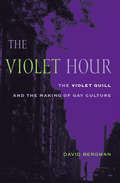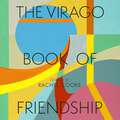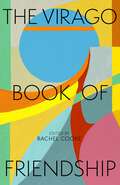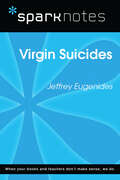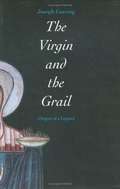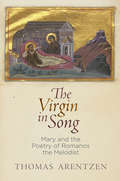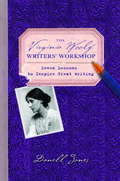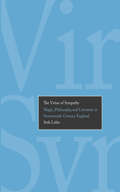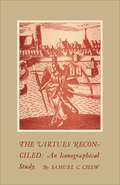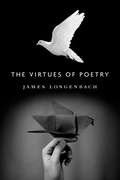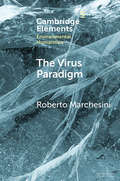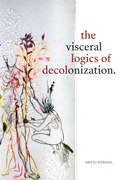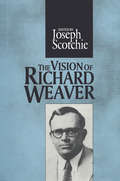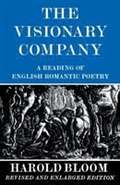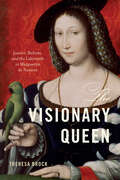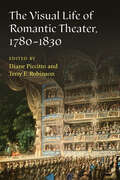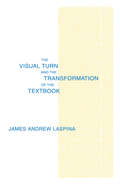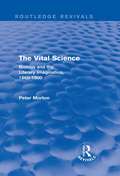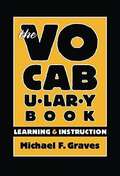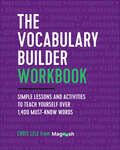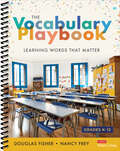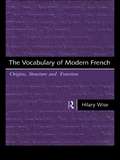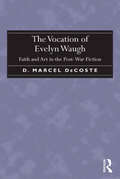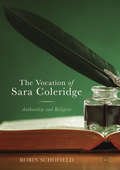- Table View
- List View
The Violet Hour: The Violet Quill and the Making of Gay Culture (Between Men-Between Women: Lesbian and Gay Studies)
by David BergmanThe members of the literary circle known as the Violet Quill—Andrew Holleran, Felice Picano, Edmund White, Christopher Cox, Michael Grumley, Robert Ferro, and George Whitmore—collectively represent the aspirations and the achievement of gay writing during and after the gay liberation movement. David Bergman's social history shows how the works of these authors reflected, advanced, and criticized the values, principles, and prejudices of the culture of gay liberation. In spinning many of the most important stories gay men told of themselves in the short period between the 1969 Stonewall Riots and the devastation of the AIDS epidemic during the 1980s, the Violet Quill exerted an enormous influence on gay culture. The death toll of the AIDS epidemic, including four of the Violet Quill's seven members, has made putting such recent events into a historical context all the more important and difficult. The work of the Violet Quill expresses the joy, suffering, grief, hope, activism, and caregiving of their generation. The Violet Hour meets the urgent need for a history of the men who bore witness not only to the birth but also to the decimation of a culture.
The Virago Book of Friendship
by Rachel CookeA fond, fascinated look at women's friendship through the fiction, diaries, and letters of friends Friendship, a timeless subject, has never been more debated, something that has to do both with the internet - the perils of WhatsApp groups, the agony of ghosting - as well as with a growing awareness that loneliness is increasing in our society. Friendship has become a matter of urgent inquiry to therapists, scientists and sociologists. We understand its importance more and more, not only as a comfort and a privilege, but as vital to our health. But it's hard to get inside friendship: its particular intensity and its miraculous ease; its tendency to wax and wane; its ability to inspire both delight and despair. This is the territory of novels and poems, diaries and letters, comics and graphic novels - and it is where the innovative and wide ranging Virago Book of Friendship steps in, bringing together work by more than 100 writers. From Jane Austen to Edith Wharton and Virginia Woolf, from Dolly Alderton to Sarah Waters and Meg Wolitzer and, it celebrates and investigates friendship between women from first encounters to final goodbyes, from falling out to making up again.
The Virago Book of Friendship
by Rachel CookeA fond, fascinated look at women's friendship through the fiction, diaries, and letters of friends Friendship, a timeless subject, has never been more debated, something that has to do both with the internet - the perils of WhatsApp groups, the agony of ghosting - as well as with a growing awareness that loneliness is increasing in our society. Friendship has become a matter of urgent inquiry to therapists, scientists and sociologists. We understand its importance more and more, not only as a comfort and a privilege, but as vital to our health. But it's hard to get inside friendship: its particular intensity and its miraculous ease; its tendency to wax and wane; its ability to inspire both delight and despair. This is the territory of novels and poems, diaries and letters, comics and graphic novels - and it is where the innovative and wide ranging Virago Book of Friendship steps in, bringing together work by more than 100 writers. From Jane Austen to Edith Wharton and Virginia Woolf, from Dolly Alderton to Sarah Waters and Meg Wolitzer and, it celebrates and investigates friendship between women from first encounters to final goodbyes, from falling out to making up again.
The Virgin Suicides (SparkNotes Literature Guide Series)
by SparkNotesThe Virgin Suicides (SparkNotes Literature Guide) by Jeffrey Eugenides Making the reading experience fun! Created by Harvard students for students everywhere, SparkNotes is a new breed of study guide: smarter, better, faster. Geared to what today's students need to know, SparkNotes provides: *Chapter-by-chapter analysis *Explanations of key themes, motifs, and symbols *A review quiz and essay topicsLively and accessible, these guides are perfect for late-night studying and writing papers
The Virgin and the Grail: Origins of a Legend
by Joseph Ward GoeringSome fifty years before Chrétien de Troyes wrote what is probably the first and certainly the most influential story of the Holy Grail, images of the Virgin Mary with a simple but radiant bowl (called a "grail" in local dialect) appeared in churches in the Spanish Pyrenees. In this fascinating book, Joseph Goering explores the links between these sacred images and the origins of one of the West's most enduring legends. While tracing the early history of the grail, Goering looks back to the Pyrenean religious paintings and argues that they were the original inspiration of the grail legend. He explains how storytellers in northern France could have learned of these paintings and how the enigmatic "grail" in the hands of the Virgin came to form the centerpiece of a story about a knight in King Arthur's court. Part of the allure of the grail, Goering argues, was that neither Chrétien nor his audience knew exactly what it represented or why it was so important. And out of the attempts to answer those questions the literature of the Holy Grail was born.
The Virgin in Song: Mary and the Poetry of Romanos the Melodist (Divinations: Rereading Late Ancient Religion)
by Thomas ArentzenAccording to legend, the Virgin appeared one Christmas Eve to an artless young man standing in one of Constantinople's most famous Marian shrines. She offered him a scroll of papyrus with the injunction that he swallow it, and following the Virgin's command, he did so. Immediately his voice turned sweet and gentle as he spontaneously intoned his hymn "The Virgin today gives birth." So was born the career of Romanos the Melodist (ca. 485-560), one of the greatest liturgical poets of Byzantium, author of at least sixty long hymns, or kontakia, that were chanted during the night vigils preceding major feasts and festivals.In The Virgin in Song, Thomas Arentzen explores the characterization of Mary in these kontakia and the ways in which the kontakia echoed the cult of the Virgin. He focuses on three key moments in her story as marked in the liturgical calendar: her encounter with Gabriel at the Annunciation, her child's birth at Christmas, and the death of her son on Good Friday. Consistently, Arentzen contends, Romanos counters expectations by shifting emphasis away from Christ himself to focus on Mary—as the subject of the erotic gaze, as a breastfeeding figure of abundance and fertility, and finally as an authoritatively vocal woman who conveys the secrets of her son and the joys of the resurrection.Through his hymns, Romanos inspired an affective relationship between Mary and his audience, bringing the human and the holy into dialogue. By plumbing her emotional depths, the poet traces her process of understanding as she apprehends the mysteries that she embodies. By giving her a powerful voice, he grants subjectivity to a maiden who becomes a mediator. Romanos shaped a figure, Arentzen argues, who related intimately to her flock in a formative period of Christian orthodoxy.
The Virginia Woolf Writers' Workshop
by Danell JonesIn this brilliantly imagined book, author Danell Jones mines the diaries, essays, correspondence, and fiction of a literary legend to create an unforgettable master class in the art of writing. Using Virginia Woolf's own words, this inspiring, instructive, and entertaining guide will delight fans, students, and teachers alike--and at last give Woolf a classroom of her own. Imagine what it might be like if Virginia Woolf were teaching a writers' workshop. What would she say? What elements of her own experience would writers today find valuable? Now one need only to look within these pages to delight in her magic. For here, perched at the podium of a classroom, Woolf is ready to discuss the advice for writers that she scattered throughout her work. From nurturing ideas and dealing with self-doubt to creating a completed work and getting published, here is a wellspring of practical advice, invaluable insights on the creative life, and dozens of "writing sparks"-- exercises for writers of all levels-- inspired by Woolf's most well-known works. Take your seat in class as she shares her wisdom, wit, and expertise on a range of matters, including: *The value of experimentation*How to use a journal for inspiration*The importance of reading, walking, and practicing*Methods for learning from great writersAlso provided are recommendations for further reading as well as the original sources of all of Woolf's quotes For deeper exploration. Let Woolf's utterly unique vision guide you to your own distinct voice at the same time that you deepen your appreciation and knowledge of her as a revolutionary writer and thinker.From the Hardcover edition.
The Virtue of Sympathy
by Prof. Seth LobisBeginning with an analysis of Shakespeare's The Tempest and building to a new reading of Milton's Paradise Lost, author Seth Lobis charts a profound change in the cultural meaning of sympathy during the seventeenth century. Having long referred to magical affinities in the universe, sympathy was increasingly understood to be a force of connection between people. By examining sympathy in literary and philosophical writing of the period, Lobis illuminates an extraordinary shift in human understanding.
The Virtues Reconciled: An Iconographical Study
by Samuel C. ChewThis volume contains the Alexander Lectures in University College, University of Toronto, for the session 1945-46, delivered by Samuel C. Chew, Professor of English Literature at Bryn Mawr College and author of Byron in England and The Crescent and the Rose. For a number of years Professor Chew has been engaged in the study of relation between poetry and the visual arts, especially in the English Renaissance. The Virtues Reconciled embodies his results in an important and more or less self-contained division of this general field. It deals with the allegorical representation, visual and verbal, of the four Virtues, Truth and Justice, Mercy and Peace. The first lecture, "The Friendship of the Arts," considers generally, but with abundant illustrative example, the nature and the relation of verbal and visual imagery. The second lecture, "The Parliament of Heaven," traces the history of the allegory of the Four Daughters of God (Truth, Justice, Mercy, and Peace), who enters into debate upon the Fall of Man and his future destiny. The problem is resolved, and the Virtues are reconciled, when the Son of God offers Himself in the Atonement. The third lecture examines more closely the various forms in which Truth and Justice are personified, both in art and literature; and the final lecture affords a similar treatment of Mercy and Peace. The argument is illustrated by eighteen plates from paintings, drawings, and title-pages. Many others are described in the text, together with the works of literature which present analogous ideas and images. Of equal value for the light which it throws on the literature of the past and on an aspect of the history of the visual arts, The Virtues Reconciled will also interest the general reader. For, as Professor Chew remarks, "by means of these images our forefathers sought to express their experiences of the changes and chances of this mortal life, and one cannot contemplate them without recognizing that these great commonplaces are still applicable to the human situation."
The Virtues of Poetry
by James LongenbachAn illuminating look at the many forms of poetry's essential excellence by James Longenbach, a writer with "an ear as subtle and assured as any American poet now writing" (John Koethe)"This book proposes some of the virtues to which the next poem might aspire: boldness, change, compression, dilation, doubt, excess, inevitability, intimacy, otherness, particularity, restraint, shyness, surprise, and worldliness. The word ‘virtue' came to English from Latin, via Old French, and while it has acquired a moral valence, the word in its earliest uses gestured toward a magical or transcendental power, a power that might be embodied by any particular substance or act. With vices I am not concerned. Unlike the short-term history of taste, which is fueled by reprimand or correction, the history of art moves from achievement to achievement. Contemporary embodiments of poetry's virtues abound, and only our devotion to a long history of excellence allows us to recognize them." –from James Longenbach's prefaceThe Virtues of Poetry is a resplendent and ultimately moving work of twelve interconnected essays, each of which describes the way in which a particular excellence is enacted in poetry. Longenbach closely reads poems by Shakespeare, Donne, Blake, Keats, Dickinson, Yeats, Pound, Bishop, and Ashbery (among others), sometimes exploring the ways in which these writers transmuted the material of their lives into art, and always emphasizing that the notions of excellence we derive from art are fluid, never fixed. Provocative, funny, and astute, The Virtues of Poetry is indispensable for readers, teachers, and writers. Longenbach reminds us that poetry delivers meaning in exacting ways, and that it is through its precision that we experience this art's lasting virtues.
The Virus Paradigm: A Planetary Ecology of the Mind (Elements in Environmental Humanities)
by Roberto MarchesiniIn recent years, the word 'virus' has lost its biological perimeter of reference to acquire a much broader – could say 'paradigmatic' – meaning. The term 'virus' can be seen as a key word or an explanatory model also for processes that go beyond the infectious sphere. Every event appears to have a viral character: from the way information is transmitted to the processes of cultural globalization, from the impact of human beings on the planet to the subversion of ecosystems, from pandemic risks to the demographic increase on the planet. This seems to be indeed the Age of the Virus. Its model can be applied to most of the phenomena that characterize the twenty-first. Its profile – its looming and invisible nature, its ability to use other people's resources to spread and to transform into a dangerous doppelganger – is perfect to represent the fears of the contemporary age.
The Visceral Logics of Decolonization
by Neetu KhannaIn The Visceral Logics of Decolonization Neetu Khanna rethinks the project of decolonization by exploring a knotted set of relations between embodied experience and political feeling that she conceptualizes as the visceral. Khanna focuses on the work of the Progressive Writers' Association (PWA)—a Marxist anticolonial literary group active in India between the 1930s and 1950s—to show how anticolonial literature is a staging ground for exploring racialized emotion and revolutionary feeling. Among others, Khanna examines novels by Mulk Raj Anand, Ahmed Ali, and Khwaja Ahmad Abbas, as well as the feminist writing of Rashid Jahan and Ismat Chughtai, who each center the somatic life of the body as a fundamental site of colonial subjugation. In this way, decolonial action comes not solely from mental transformation, but from a reconstitution of the sensorial nodes of the body. The visceral, Khanna contends, therefore becomes a critical dimension of Marxist theories of revolutionary consciousness. In tracing the contours of the visceral's role in decolonial literature and politics, Khanna bridges affect and postcolonial theory in new and provocative ways.
The Vision of Richard Weaver (The Library of Conservative Thought)
by Joseph A. ScotchieRichard M. Weaver was one of the founders of modern conservatism. He is an enduring intellectual figure of twentieth-century America. Weaver was dedicated to examining the dual nature of human beings and the quest for civilized communities in a corrupted age that believed in the religion of science and in the "natural goodness" of man. The Vision of Richard Weaver is the first collection of essays about this seminal thinker.Thirty years after his untimely death, Richard Weaver remains a heroic figure to many conservatives and traditionalists concerned about the state of American culture. Now a new generation of readers can understand the importance of this pioneer of thought. The Vision of Richard Weaver will be of significant value to political theorists, philosophers, and students of American civilization.
The Visionary Company: A Reading of English Romantic Poetry
by Harold BloomThis is a revised and enlarged edition of the most extensive and detailed critical reading of English Romantic poetry ever attempted in a single volume. It is both a valuable introduction to the Romantics and an influential work of literary criticism. The perceptive interpretations of the major poems of Blake, Wordsworth, Coleridge, Byron, Shelley, Keats, Beddoes, Clare, and Darley develop the themes of Romantic myth-making and the dialectical relationship between nature and imagination. For this new edition, Harold Bloom has added an introductory essay on the historical backgrounds of English Romantic poetry and an epilogue relating his book to literary trends.
The Visionary Queen: Justice, Reform, and the Labyrinth in Marguerite de Navarre (EARLY MODERN FEMINISMS)
by Theresa BrockThe Visionary Queen affirms Marguerite de Navarre’s status not only as a political figure, author, or proponent of nonschismatic reform but also as a visionary. In her life and writings, the queen of Navarre dissected the injustices that her society and its institutions perpetuated against women. We also see evidence that she used her literary texts, especially the Heptaméron, as an exploratory space in which to generate a creative vision for institutional reform. The Heptaméron’s approach to reform emerges from statistical analysis of the text’s seventy-two tales, which reveals new insights into trends within the work, including the different categories of wrongdoing by male, institutional representatives from the Church and aristocracy, as well as the varying responses to injustice that characters in the tales employ as they pursue reform. Throughout its chapters, The Visionary Queen foregrounds the trope of the labyrinth, a potent symbol in early modern Europe that encapsulated both the fallen world and redemption, two themes that underlie Marguerite's project of reform.
The Visual Life of Romantic Theater, 1780-1830
by Diane Piccitto Terry F. RobinsonThe Visual Life of Romantic Theater examines the dynamism and vibrancy of stage spectacle and its impact in an era of momentous social upheaval and aesthetic change. Situating theatrical production as key to understanding visuality ca. 1780-1830, this book places the stage front and center in Romantic scholarship by re-envisioning traditional approaches to artistic and social creation in the period. How, it asks, did dramaturgy and stagecraft influence aesthetic and sociopolitical concerns? How does a focus on visuality expand our understanding of the historical experience of theatergoing? In what ways did stage performance converge with visual culture beyond the theater? How did extratheatrical genres engage with theatrical sight and spectacle? Finally, how does a focus on dramatic vision change the way we conceive of Romanticism itself? The volume’s essays by emerging and established scholars provide exciting and suggestive answers to these questions, along with a more capacious conception of Romantic theater as a locus of visual culture that reached well beyond playhouse walls.
The Visual Turn and the Transformation of the Textbook
by James A. LaSpinaIs the emerging digital multimedia culture of today transforming the textbook or forever displacing it? As new media of transmission enter the classroom, the traditional textbook is now caught up in a dialogue reshaping the textual boundaries of the book, and with it the traditional modes of cognition and learning, which are bound more to language than to visual form. Most of the important work in the past two decades in the field of curriculum has focused on the culture of the textbook. A rich literature has evolved around textbooks as the traditional object of instructional activity. This volume is an important contribution to this literature, which focuses on the actual making of a textbook. This design process serves as a metaphor that suggests new paradigms of learning and instruction, in which text content is but one component in a multidimensional information space.The Visual Turn is an exploration along the border of this new learning space transforming the traditional center of instruction in the classroom.
The Vital Science: Biology and the Literary Imagination,1860-1900 (Routledge Revivals)
by Peter MortonIn this title, first published in 1984, Peter Morton argues that in late Victorian Britain a group of novelists and essayists quite consciously sought and found ideas in post-Darwinian biology that were susceptible to imaginative transformation. The period between 1860 and 1900 was a time of great confusion in biology; the natural selection hypothesis was in retreat before its acute critics, and no extension of evolutionary theory to human affairs was too bizarre to attract its quota of enthusiasts. Writers capitalised on this prevailing uncertainty and used it to their own artistic or polemic ends. A fascinating and interdisciplinary title, this reissue will interest students of late Victorian literature, as well as historians of biological theory between The Origin of Species and Mendel.
The Vocabulary Book: Learning And Instruction (Language And Literacy Series)
by Michael F. Graves Anne Haas DysonThis text presents a comprehensive plan for vocabulary instruction from kindergarten through high school, one broad enough to instruct students with small vocabularies, exceptional vocabularies, and every child in between. Written by one of the top experts in the field, this practical book presents a research-based program with plenty of classroom examples and strategies that teachers can use. The comprehensive plan includes four parts: rich and varied language experiences, teaching individual words, teaching word learning strategies, and fostering word consciousness.
The Vocabulary Builder Workbook: Simple Lessons and Activities to Teach Yourself Over 1,400 Must-Know Words
by Chris LeleImprove your vocabulary with simple lessons and activitiesBuilding your vocabulary requires more than flash cards. That's why leading test-prep expert, Chris Lele, developed a new method for introducing words into your vocabulary. With The Vocabulary Builder Workbook, you'll gain and retain a fundamental understanding of more than 1,400 essential words.Ideal for those taking the SAT, ACT, or GRE—or for those who simply want to practice and boost their reading, writing and speaking skills— this workbook for adults and teens makes the task of expanding your vocabulary an opportunity for real learning and growth.If you're looking for books to better your vocabulary, this vocabulary workbook includes:Expert Lessons—Explore lessons organized by theme to help you identify roots, form associations, and recognize thousands of additional words outside of this workbook.A progressive approach—Build up your SAT vocabulary with lessons that steadily increase in difficulty for continued advancement.Retention-focused activities—Discover exercises designed to help you remember every word long after the test is over.Increase your vocabulary and become a better reader, writer, and test-taker with The Vocabulary Builder Workbook.
The Vocabulary Playbook: Learning Words That Matter, K-12
by Douglas Fisher Nancy FreyConcepts, conversation, collaboration—vocabulary instruction is so much more than lists of words. More is more when it comes to students’ vocabulary knowledge, and in The Vocabulary Playbook, educators in K-12 get ideas for transforming all children into curious, capable word learners. The key? Put away the word-list mindset, and embrace active modeling, peer work, and independent practice. Five modules offer direct instruction and effective routines that show how to: Select and teach only the most high-utility, transferable words that are ripe for discussion Use direct instruction to model word-solving in each content area Teach morphology in ways that invite students to apply understandings in reading, writing, talk, and listening Turn academic word-learning into a relevant experience with peer collaboration activities Create a culture of word consciousness by emphasizing concepts, modeling curiosity, and offering "low-risk" routines that make it okay to not yet know Intentional vocabulary instruction is critical in every grade, and in every content area. With The Vocabulary Playbook, your approach is now tactical, transparent, and fun. Whether you are an administrator executing a school-wide plan or a teacher eager for practical strategies, this is the book that will help students build academic success—word by word.
The Vocabulary Playbook: Learning Words That Matter, K-12
by Douglas Fisher Nancy FreyConcepts, conversation, collaboration—vocabulary instruction is so much more than lists of words. More is more when it comes to students’ vocabulary knowledge, and in The Vocabulary Playbook, educators in K-12 get ideas for transforming all children into curious, capable word learners. The key? Put away the word-list mindset, and embrace active modeling, peer work, and independent practice. Five modules offer direct instruction and effective routines that show how to: Select and teach only the most high-utility, transferable words that are ripe for discussion Use direct instruction to model word-solving in each content area Teach morphology in ways that invite students to apply understandings in reading, writing, talk, and listening Turn academic word-learning into a relevant experience with peer collaboration activities Create a culture of word consciousness by emphasizing concepts, modeling curiosity, and offering "low-risk" routines that make it okay to not yet know Intentional vocabulary instruction is critical in every grade, and in every content area. With The Vocabulary Playbook, your approach is now tactical, transparent, and fun. Whether you are an administrator executing a school-wide plan or a teacher eager for practical strategies, this is the book that will help students build academic success—word by word.
The Vocabulary of Modern French: Origins, Structure and Function
by Hilary WiseThe Vocabulary of Modern French provides a fresh insight into contemporary French. With this book, Hilary Wise offers the first comprehensive overview of the modern French vocabulary: its historical sources, formal organisation and social and stylistic functions. Topics covered include: * external influences on the language * word formation * semantic change * style and register In addition, the author looks at the relationship between social and lexical change and examines attempts at intervention in the development of the language. Each chapter is concluded by notes for further reading, and by suggestions for project work which are designed to increase awareness of specific lexical phenomena and enable the student-reader to use lexicographic databases of all kinds. The Vocabulary of Modern French is an accessible and fascinating study of the relationship between a nation and its language, as well as providing a key text for all students of modern French.
The Vocation of Evelyn Waugh: Faith and Art in the Post-War Fiction
by D. Marcel DeCosteArguing against the critical commonplace that Evelyn Waugh’s post-war fiction represents a decline in his powers as a writer, D. Marcel DeCoste offers detailed analyses of Waugh's major works from Brideshead Revisited to Unconditional Surrender. Rather than representing an ill-advised departure from his true calling as an iconoclastic satirist, DeCoste suggests, these novels form a cohesive, artful whole precisely as they explore the extent to which the writer’s and the Catholic’s vocations can coincide. For all their generic and stylistic diversity, these novels pursue a new, sustained exploration of Waugh’s art and faith both. As DeCoste shows, Waugh offers in his later works an under-remarked meditation on the dangers of a too-avid devotion to art in the context of modern secularism, forging in the second half of his career a literary achievement that both narrates and enacts a contrary, and Catholic, literary vocation.
The Vocation of Sara Coleridge: Authorship and Religion
by Robin SchofieldThis book presents a fundamental reassessment of Sara Coleridge. It examines her achievements as an author in the public sphere, and celebrates her interventions in what was a masculine genre of religious polemics. Sara Coleridge the religious author was the peer of such major figures as John Henry Newman and F. D. Maurice, and recognized as such by contemporaries. Her strategic negotiations with conventions of gender and authorship were subtle and successful. In this rediscovery of Sara Coleridge the author revises perspectives upon her literary relationship with Samuel Taylor Coleridge. Far from sacrificing her opportunities in service of her father’s memory, her rationale is to exploit his metaphysics in original religious writings that engage with urgent controversies of her own times. Sara Coleridge critiques the Oxford theology of Newman and his colleagues for authoritarian and elitist tendencies, and for creating a negative culture in religious discourse. In response, she experiments with methodologies of collaborative, dialogic exchange, in which form as much as content will promote liberal, inclusive and productive encounters. She develops this agenda in her major religious work, the unpublished Dialogues on Regeneration (1850–51), which this book examines in its penultimate chapter.
